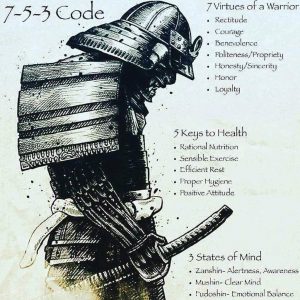There were various groups of people throughout history from whom we could learn much. That’s not to say that they were 100% right about everything all the time or that their lifestyle should be adopted in a saturation fashion. But when you think about it, there is something we can learn from everyone. When you look back in history and see a culture that significantly stood the test of time, contributed to the overall well-being of their community and were respected (not out of fear) by those they served, it’s likely a group worth paying attention to. The Samurai were such a group.
 Thus, this image, when I found it, struck me as worth sharing and commenting on. While this entry will focus on the portion about the “5 Key to Health,” the 7 Virtues of a Warrior and the 3 States of Mind are worth paying attention to. The reality, as I understand it, is that they all work together in a mutually supportive fashion. A properly disciplined mind in a healthy body allowed for adherence to the virtues of a warrior. It’s worth noting that those seven virtues are admirable in EVERYONE; not just warriors.
Thus, this image, when I found it, struck me as worth sharing and commenting on. While this entry will focus on the portion about the “5 Key to Health,” the 7 Virtues of a Warrior and the 3 States of Mind are worth paying attention to. The reality, as I understand it, is that they all work together in a mutually supportive fashion. A properly disciplined mind in a healthy body allowed for adherence to the virtues of a warrior. It’s worth noting that those seven virtues are admirable in EVERYONE; not just warriors.
But for now, let’s take a look at the five keys to health. The first one up is…
Rational nutrition. What’s meant by that? “Rational” is defined as having or exercising reason, sound judgment, or good sense. Put simply, eat a diet that doesn’t harm your body. The cool part is that if you’re not doing harm, you’re pretty much defaulting to doing good – or healthy. Rational Nutrition means eating things that are good for you and fuel your system for growth and maintenance. Our body needs protein, healthy fats and some carbohydrates (carbs) to function. No matter what nutrition program you’re using, if you’re taking in enough protein, healthy fats and carbs while avoiding too much sugar and unhealthy fats, you’re doing well. There IS such a thing as “too much” for protein, fats and carbs. Track your intake and know your balance. (I like to use MyFitnessPal.com. It’s a free online system that has mobile apps available for free as well.)
Sensible Exercise. What is “sensible exercise”? “Sensible” is a synonym for “rational.” They both mean (essentially) using common sense and good judgment. Exercise is… well… exercise. But what is “sensible exercise”? It’s exercise that 1) doesn’t injure your body and 2) develops all three components of physical fitness: strength, flexibility, endurance. That means your exercise program should train all three and allow for recovery after you’ve done anything that leaves you sore. Stop and think for a moment about your current exercise regimen (if you have one) and ask yourself if it addresses all three components: strength, flexibility and endurance. Many folks I know are avid weight lifters and they use cardiovascular exercise to burn fat so they can get that “cut” look. But they do little to know exercise that increases or even maintains their flexibility. I know folks who do a lot of exercise that increases their strength and flexibility but does little to nothing to work their cardiac system. For your own personal well-being and maximum long term health benefit, you must train all three.
Efficient Rest. There was a time, back in my youth, when I could sleep standing up because I exhausted myself so thoroughly each day (actually, Uncle Sam’s Army exhausted me). While I was snatching ten minutes of not-nearly-fitful sleep, I wasn’t getting much rest. My brain was turning off momentarily but my body couldn’t relax much. Efficient rest is six to eight hours of solid sleep in each 24 hour period. Typically, we humans can function fairly efficiently for 14-18 hours before we start to overload our bodies or our minds. That’s TYPICAL. Depending on the demands of the day, that could be shorter but it rarely gets much longer. We can push to 20-24 hours, but then our recovery sleep period has to be longer as well. The cool part about maintaining a higher fitness level is that you sleep better and more comfortably. So, make time in your schedule for that six to eight hours of sleep. (Personal needs vary and you should learn the needs of your body and mind as they change when you undertake a health regimen.)
Proper hygiene. This one shouldn’t need explanation. Keep yourself clean. What most folks forget is that means inside and out. We all shower and shave in some way. We (hopefully) all brush our teeth and keep our ears clean. But what you eat and in what quantities impacts how clean you are inside (your digestive system and your blood). That impacts the health of your kidneys, liver, lungs and more. Proper hygiene isn’t just making sure you don’t stink but is a maintenance system that, when practiced holistically, increases your health overall and staves off infections and deficiencies.
Positive attitude. This is one of my favorites because it’s a key to health but has nothing to do with the physical. This is all about your mental outlook; your levels of motivation; your response to challenge and how you manage stress. I’ve seen people with identical illnesses in near identical work environments, of similar ages and health status, overcome the illness in entirely different fashions – based on their attitude. One man’s outlook was, “Okay. This is what I’ve got. This is how I defeat it. Here’s the plan, let’s make it happen.” And he had that outlook SURE that he’d overcome the health challenge. Another man’s outlook was, “Heck. This is a big blow. I hope I can fight this. I hope I can defeat it. I hope my doctor can give me the right medicines so my body can maybe overcome it.” That’s a lot of hope and one big maybe. It’s not confidence. It’s not positive. It’s negative in its own approach to self-strength. A positive attitude makes all the difference.
* * * * * *
So, those are the five addresses here in the 7-5-3 Code, all about Warrior Virtues. I submit to you that we are ALL warriors fighting some battle, no matter how personal, and we need to embrace these values to overcome the challenge.


